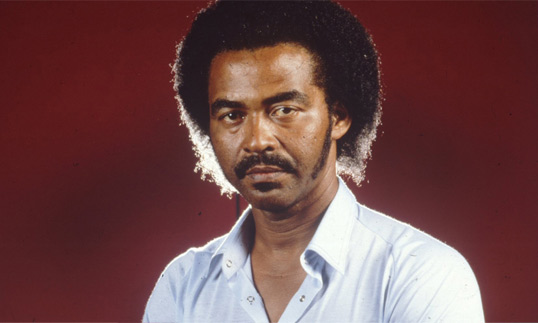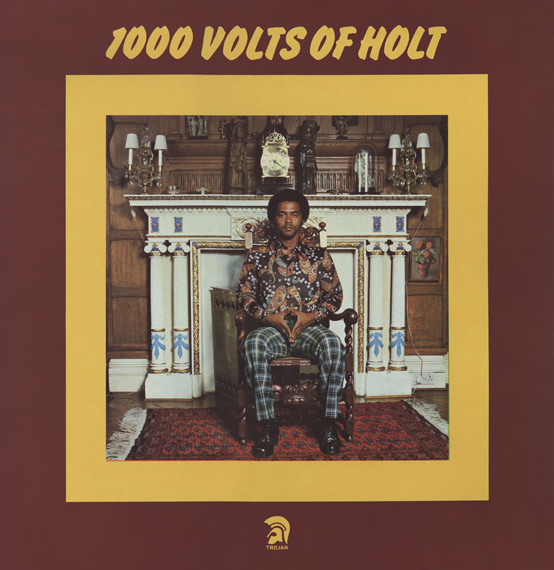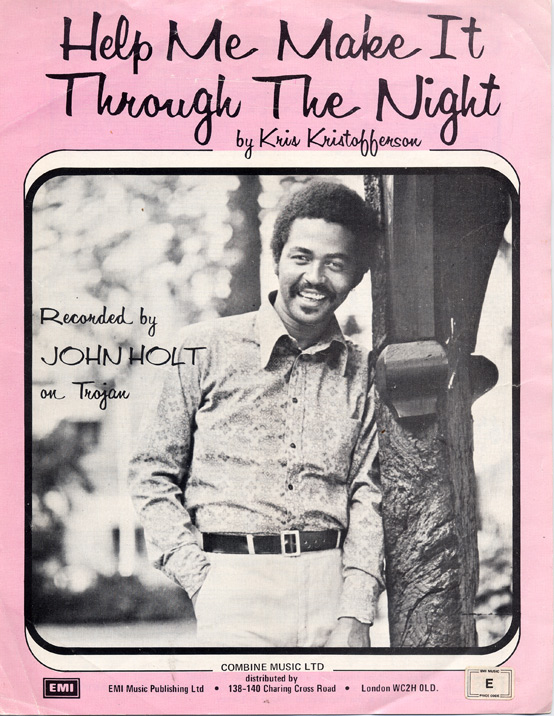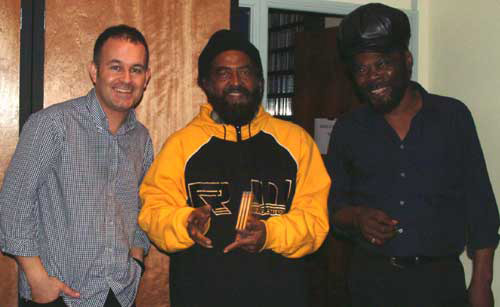John Holt: Legendary Paragon of Reggae

His voice graced literally hundreds of recordings, many of them now considered classics, while his groundbreaking albums, ‘The Further You Look’ and ‘1000 Volts Of Holt’ helped pushed the boundaries of Jamaican music beyond its previously conceived limits by introducing entire collections comprised of highly sophisticated produced recordings.
John Kenneth Holt was born on 11th July 1947 and raised in Kingston, Jamaica, where he was exposed to a rich variety of musical sounds throughout his youth. By his early teens had developed a keen interest in music, but despite his blossoming singing skills, he lacked the courage to perform publicly, as he related to pioneering British Reggae journalist Carl Gayle in 1974:
???School really wasn’t my thing… I preferred singing. I never attended singing class, though, I was scared. I was actually forced to sing in school by my friends, I didn’t have the nerve y’know to really go out and do it.”
During the late fifties and early sixties, the most accessible route for any aspiring performer to achieve stardom was by gaining recognition at one of the numerous talent contests held in and around Kingston and it was this avenue that eventually provided the opportunity for Holt to illustrate his singing prowess. By 1960 he had overcome his initial shyness and began impressing audiences with his interpretations of songs by his favourite vocalist, American teen idol, Jimmy Clanton. During this time, the young singer found himself in direct competition with a number of other hopefuls who would also go on to achieve stardom, as he later recalled???
???I used to whip Jimmy Cliff’s ass, y’know??? he was afraid. If he knew I was gonna sing tonight for instance, he wouldn’t turn up.”

After two years honing his singing skills at shows, Holt was finally ready to make his mark as a recording artist and after one of his winning performances was highlighted in both of the island’s two national papers, the Star and the Gleaner, he was approached by fledgling producer, Leslie Kong with a view to cutting a disc.
At a subsequent session arranged by Kong at Federal studios, Holt recorded a couple of original compositions, ???Forever I’ll Stay” and ???I Cried A Tear”, backed by leading instrumental group, Colsten Chen & the Vagabonds. The recordings were issued back to back on the producer’s recently launched Beverley’s label, but while the record sold well enough, Holt experienced a plight common among Jamaican recording fraternity; negligible financial remuneration. Despondent, but determined to make singing his profession, Holt teamed up with Alton Ellis whose former singing partner, Eddy Perkins had recently departed for America. Holt and Ellis went on to record the best selling ???Mouth A Massie Liza” and ???Rum Bumper” for Vincent Chin of Randy’s Records, but once again, the singer saw little in the way of royalties. After a brief sojourn with leading producer, Clement ‘Coxsone’ Dodd, Holt decided to call it a day???
???Because things weren’t so right and you had better or bigger singers than myself, like Owen Gray and Jackie Edwards, I was too far in the background, so I quit for a while.”
After a year away from the music scene, Holt was finally came out of his premature retirement to join a local vocal group called the Binders who had recently lost the services of their lead singer, Leroy Stamp. The remaining three members were not only all performers of considerable merit, but also hugely talented songwriters, with Keith Anderson (aka Bob Andy), Garth ‘Tyrone’ Evans and Junior Menz all going on to pen songs later regarded as Jamaican classics. Soon after Holt was recruited into their ranks, the group experienced further changes in personnel, with Menz departing to be replaced by Howard Barrett. The new line-up signalled a change of direction for group, which was further emphasized by a new name; from now on, they would be known as the Paragons.
The Paragons quickly set about making their mark on the Jamaican music scene, making regular appearances on the island’s club and hotel circuit and recording a number of Doo Wop flavoured hits for Coxsone Dodd. These included ???(In) Love At Last”, ???Love Dream”, ???Follow Me”, ???Play Girl”, ???Good Luck And Goodbye”, ???I Was Lonely” and ???Live And Love You”, all of which saw issue around 1965. But for all their success, internal differences within the group became increasingly apparent and by 1966, Andy had left the group to pursue what proved to be a highly successful solo career. His departure left the Paragons in a state of turmoil and there followed months inactivity before the three remaining members eventually decided to relaunching the group as a trio towards the close of the year. Still boasting considerable singing and songwriting talent, the group had little difficulty in securing a new recording deal and promptly signed with producer Arthur ‘Duke’ Reid. Among the songs cut at the group’s initial session for Reid was ???Happy Go Lucky Girl” which quickly became a major hit on the island and over the ensuing months, the Paragons added to their tally of successful singles with ???On The Beach”, ???Only A Smile”, ???The Tide Is High” and ???Wear You To The Ball”, all of which appeared on their debut album, ???On The Beach”. Although the trio briefly strayed from Reid’s Treasure Isle operations around the close of 1967 to record a handful of songs (including the hit ???Talking Love”) for Federal Records, it was with the Duke they continued to enjoy their greatest success.

1968 began as the previous year had ended, with ???My Best Girl” and ???Silver Bird” both topping the Jamaican listings. Yet for all their popularity, the Paragons received little in the way of hard cash. In a bold attempt to take complete control over their work, the trio formed their own Supertone label, although after just two releases, the project floundered, due primarily to the island’s corrupted system of record distribution. None the less, the two records in question had both been vintage Paragons, with three of the four songs issued becoming widely considered as Jamaican classics; ???Memories By The Score”, ???I’ve Got To Get Away” (aka ???Man Next Door”) and a superb rendering of the Four Tops’ ???Left With A Broken Heart”.
Following the failure of their label, the trio returned briefly returned to work with Coxsone Dodd, for whom they recorded a quartet of songs, of which the most popular was the haunting ???My Satisfaction (aka ???Late At Night)”. Shortly after their sojourn with Dodd, Barrett relocated to New York and while Holt and Evans attempted to maintain the group as a duo (cutting with the excellent ???Equality And Justice” and ???You Mean So Much To Me” for Lloyd Daley), by the beginning of 1969, it was all over for the Paragons. Evans went on to cut a one-off single with Bob Andy and alter sang with Bruce Ruffin in the Shades before he too moved to New York around the close of 1970.
Holt, meanwhile, set about making his mark as a solo artist. He had in fact recorded a couple of sides away from the group shortly before Barrett’s departure, recording ???Tonight” and a duet with American singer, Joya Landis, entitled ???I’ll Be Lonely”. Produced by Duke Reid, both songs were issued towards the close of 1968 and their popularity no doubt influenced Holt’s decision to go it alone.
Freed from the constraints of group decision making, he discovered a new freedom in his work and over the next few years enjoyed considerable success, working with a variety of producers. Among his most popular recordings from this time are ???Ali Baba”, ???Stealing Stealing” (both for Duke Reid), ???Never Hurt My Baby” (Keith Hudson), ???Have Sympathy” (Harry Johnson), ???A Love I Can Feel” (Coxsone Dodd), ???Linger A While” (Lloyd Daley), ???My Heart Is Gone”, ???Strange Things” (both Phil Pratt), ???Stick By Me” and ???Pledging My Love” (Bunny Lee). In addition, Holt saw the release of five collections of his work, with Coxsone Dodd issuing ???A Love I Can Feel” and ???Greatest Hits”, and Bunny Lee releasing ???Holt”, ???Still In Chains” and ???Pledging My Love”.
By 1972, Holt was firmly established as one of Jamaica’s leading vocalists, with a series of ‘Best male Vocalist’ title to his name, but for all his success at home, his talents were yet to be widely recognized abroad. All that was to change with the release of his initial collaborations with British manager/producer, Tony Ashfield. Ashfield, who had previously operated a UK-based sound system, had recently turned his hand to producing, experimenting with sound techniques at a small studio owned by Holt’s Road manager, Terry Newman. It was through Newman that Ashfield first met the singer in 1968, during Holt’s first visit to Britain. Two years later, the pair renewed acquaintances while Holt was in the country for an appearance at the Wembley Reggae Festival and the pair soon began discussing the possibilities of forming a record production company of their own. Before long, their plans for a joint project were realized with the launch of Chaguaranmas Productions.

John Holt at the Trojan Offices, London. 2005
After returning to Jamaica, Holt began recording rhythm tracks for a number of songs that were later embellished with vocal, string, horn and flute over-dubs by Ashfield at Intersound and Lansdowne Studios, London. Among the array of talent involved at this stage were respected American Soul singer, Doris Troy and former Blue Mink vocalist, Madeline Bell (both singing backing vocals) and one-time Pop star, Mike Berry, who supervised the final mix of the tracks at Audio International Studios.
By 1973, a dozen such recordings were ready for release and gathered on the Trojan LP, ???The Further You Look” (aka ???Sings For I”), which promptly topped the UK Reggae album charts. But while the use of sophisticated arrangements with raw urban Jamaican rhythms proved popular with the British public at large, many critics and so-called purists were quick to dismiss the style, accusing the singer of selling out in a bid for wider commercial appeal. Undaunted by such remarks, the Holt/Ashfield partnership continued unabated, with a second collection of similarly styled recordings appearing soon after on the album, ???A Thousand Volts Of Holt”. Sales of the LP quickly surpassed those of the previous volume and had it not been for the peculiarity of the distribution of Reggae releases in Britain, would have almost certainly topped the country’s Pop charts. ???Volts” also included a recording that went on to become one of the biggest selling Reggae singles of all time – ???Help Me Make It Through The Night”. Written by Country singer/songwriter, Kris Kristofferson, the song had originally provided a US chart hit for Nashville-based singer Sammi Smith in 1971, before being covered by a variety of performers, most notably Joe Simon, O. C. Smith and Gladys Knight & the Pips. Of these, only the latter version succeeded in breaching the British charts, the disc climbing to number eleven around the close of 1972. This notable achievement was eclipsed two years later, when Holt’s rendering peaked at number six in the UK listings early in 1974, remaining in the Pop charts for a total of fourteen weeks.
To promote the single and the album, Holt once again took the opportunity to tour Britain, taking time out in between live shows to voice further Ashfield produced recordings which appeared later that year on the ???Dusty Roads” album. By now, Ashfield was planning to develop Chaguaranmas Productions into a Jamaican music corporation in the mould of Motown and Stax and brought in respected arranger Rob Powell to work on various projects for the company. These included an album with Jamaican group, the Chosen Few and a collection of instrumental sides by respected session pianist, Gladstone Anderson, who also arranged Holt’s sessions in Jamaica.
Around the close of 1974, Holt began recording material for another album with Ashfield, although by now signs of strains in their relationship were becoming increasingly apparent and by the time Trojan issued what proved to be the final collaboration, ???2,000 Volts Of Holt” the following year, their partnership had come to an end. In the months following the acrimonious split, Holt had no difficulties maintaining his popularity, with many Reggae fans openly expressing delight that the singer had decided to end what they regarded a misguided dalliance with a style sneeringly labelled ‘Pop Reggae’. Over the next year or so, Holt recorded primarily with Bunny Lee, their collaborations resulting in two further albums, ???Superstar” and ???World Of Love”, with the latter issued in the UK by Trojan as ???3,000 Volts Of Holt” in 1977.
The preceding year, the singer briefly reunited with Tyrone Evans and Howard Barrett to record ???Let The Wicked Run Away” (aka ???Do The Best Thing”), a superb Roots number that echoed the Paragons glory days of the late sixties. Also around this time, he also worked with Joseph ‘Jo Jo’ Hookim of Channel One Records, with their sessions yielding a number of excellent sides including a trio of Jamaican hits; ???Up Park Camp”, ???Ghetto Girl” and an updated version of an old Paragons number, ???Hooligans” (aka ???Don’t Fight Your Brothers”).
Holt continued to enjoy success both at home and in Europe throughout the remainder of the seventies. In 1978 Bunny Lee released yet another album of his work, ???In Demand”, which Trojan subsequently released as ???Just A Country Boy”, while the following year his updated version of the Delano Stewart hit, ???Rock With Me Baby” became the first 12″ single to be issued by the British company. Following the success of the disc, Trojan released a selection of newly recorded extended mixes on the somewhat misleadingly titled ???Holt Goes Disco”, which saw issue in Jamaica as ???New Disco Style Showcase”. Further similar collections followed in Jamaica with ???A-1 Disco Showcase” and ???Introspective”, although neither officially saw release in the UK.
After the release of the self-produced ???Let It Go On” album towards the close of 1978, Holt embarked on a hectic touring schedule and while performing in the U.S. took the opportunity to meet up with former singing partners, Tyrone Evans and Howard Barrett. This encounter, allied to the international success of Blondie’s reworking of ???The Tide Is High” in 1980 prompted the Paragons to reform and the following year, Island Records issued an album of newly recorded material by the group entitled ???Sly & Robbie Present The Paragons”. Despite the positive reaction to the album from critics and Reggae fans alike, Holt decided to concentrate on his solo work and in 1982 started working with Henry ‘Junjo’ Lawes, Reggae music’s leading hit maker of the period. Major Jamaican hits swiftly followed with ???Fat She Fat”, ???Sweetie Come Brush Me” and the banned ???Police In Helicopter”, all of which contrasted starkly with the romantically themed recordings of his earlier work. These and further Lawes-produced material on the ???Sweetie Come Brush Me” (aka ???Gold”) and ???Police In Helicopter” collections illustrated Holt was more than capable of holding his own as a Roots singer.
Throughout the remainder of the eighties and well into the 21st Century, Holt continued to tread his own path, refusing to alter his approach to music making in accordance with the various musical trends that came and went over the intervening years.
The singer’s tragic passing comes just a few months after he collapsed on stage at the One Love Festival in Milton Keynes on 16th August. Despite receiving treatment in London, John Holt sadly passed away at 2:40am GMT last night.
His death comes as a huge blow, not to just those who were able to enjoy his music over the years, but also to his family and those fortunate enough to made his acquaintance. He was a giant of Jamaican music and a true gentleman in an often cutthroat business. He will always be missed, but at least through his wonderful recordings, he will always remembered.
LAURENCE CANE-HONEYSETT
